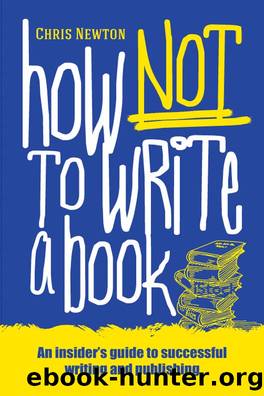How Not To Write A Book by Chris Newton

Author:Chris Newton [Newton, Chris]
Language: eng
Format: epub
Tags: An insider's guide to successful writing and publishing for beginners
Publisher: Memoirs Publishing
Published: 2016-01-11T00:00:00+00:00
Itâs clear that a lot of people who launch themselves into writing in these genres have abandoned the basic requirement of the novelist to be original. Science fiction fans and Tolkienists may get away with this, to an extent; the sales figures for works in these categories indicate that even highly-derivative stories can find followers if the adventures are well told and the settings exciting and compelling.
Nevertheless, exactly the same rules apply. Your characters should be people, not caricatures or clichés. That means they must be believable; neither too fearless and heroic (the goodies) nor too unremittingly evil (the baddies).
The story has to be credible â you need to be able to suspend disbelief. Fantastic and impossible things may happen, but they must follow a consistent set of rules. Look at Gulliverâs Travels; the basic idea of the main part of the story, that a man travelling the world might come across lands where the people are vastly bigger or smaller than he is, is plain ludicrous, and would have been equally so in the early 18th century. But itâs an entrancing novel, thanks in large part to Swiftâs considerable skill at story-telling, and it has been reprinted (and more recently filmed) down the ages. It would have gone wrong, however, if Swift had continued to pile improbability upon improbability. As it is, everything that happens in each section of the book is a logical outcome from just one whopping improbability. The writer explores the question: imagine what would happen if a normal human encountered a race of otherwise normal people who are only six inches tall. Gulliver is an early example of a high-concept story - one based on a simple big idea.
If youâre writing sci fi or fantasy you will have to work at your settings, because unlike authors of conventional fiction, you wonât be able to write âa wet Saturday morning in Oxford Streetâ and leave the rest to the readerâs imagination. I have seen many submissions which failed to invoke any sense of place. You read a few paragraphs and find yourself thinking, Where the hell are we? What does this place look like?
Download
This site does not store any files on its server. We only index and link to content provided by other sites. Please contact the content providers to delete copyright contents if any and email us, we'll remove relevant links or contents immediately.
| Authorship | Bibliographies & Indexes |
| Book Industry |
Autoboyography by Christina Lauren(4692)
Asking the Right Questions: A Guide to Critical Thinking by M. Neil Browne & Stuart M. Keeley(4627)
Dialogue by Robert McKee(3611)
Eat That Frog! by Brian Tracy(3550)
Sticky Fingers by Joe Hagan(3466)
Journeys Out of the Body by Robert Monroe(3016)
Elements of Style 2017 by Richard De A'Morelli(2953)
Annapurna by Maurice Herzog(2860)
Schaum's Quick Guide to Writing Great Short Stories by Margaret Lucke(2819)
Full Circle by Michael Palin(2793)
The Diviners by Libba Bray(2458)
The Art of Dramatic Writing: Its Basis in the Creative Interpretation of Human Motives by Egri Lajos(2428)
The Mental Game of Writing: How to Overcome Obstacles, Stay Creative and Productive, and Free Your Mind for Success by James Scott Bell(2404)
Why I Write by George Orwell(2378)
Atlas Obscura by Joshua Foer(2359)
In Patagonia by Bruce Chatwin(2287)
The Fight by Norman Mailer(2170)
The Elements of Style by William Strunk and E. B. White(2081)
Venice by Jan Morris(2063)
